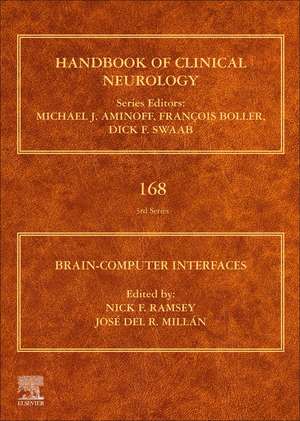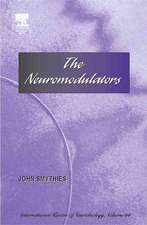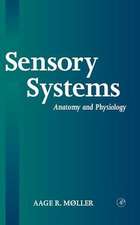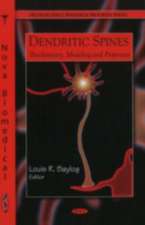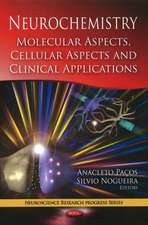Brain-Computer Interfaces: Handbook of Clinical Neurology, cartea 168
Nick F. Ramsey, José del R. Millánen Limba Engleză Hardback – apr 2020
- Explores how many different causes of disability have similar functional consequences (loss of mobility, communication etc.)
- Addresses how BCI can be of use
- Presents a multidisciplinary review of BCI technologies and the opportunities they provide for people in need of a new kind of prosthetic
- Offers a comprehensive, multidisciplinary review of BCI for researchers in neuroscience and traumatic brain injury that is also ideal for clinicians in neurology and neurosurgery
Din seria Handbook of Clinical Neurology
- 20%
 Preț: 1274.52 lei
Preț: 1274.52 lei - 20%
 Preț: 1311.43 lei
Preț: 1311.43 lei - 23%
 Preț: 1286.74 lei
Preț: 1286.74 lei - 20%
 Preț: 1344.20 lei
Preț: 1344.20 lei - 20%
 Preț: 1349.51 lei
Preț: 1349.51 lei - 24%
 Preț: 1275.78 lei
Preț: 1275.78 lei - 20%
 Preț: 1344.02 lei
Preț: 1344.02 lei - 20%
 Preț: 1339.70 lei
Preț: 1339.70 lei - 20%
 Preț: 1316.98 lei
Preț: 1316.98 lei - 20%
 Preț: 1315.38 lei
Preț: 1315.38 lei - 20%
 Preț: 1329.13 lei
Preț: 1329.13 lei - 20%
 Preț: 1313.06 lei
Preț: 1313.06 lei - 5%
 Preț: 1309.43 lei
Preț: 1309.43 lei - 5%
 Preț: 1300.74 lei
Preț: 1300.74 lei - 20%
 Preț: 1302.98 lei
Preț: 1302.98 lei - 20%
 Preț: 1304.03 lei
Preț: 1304.03 lei - 20%
 Preț: 1304.66 lei
Preț: 1304.66 lei - 20%
 Preț: 1303.13 lei
Preț: 1303.13 lei - 20%
 Preț: 1319.00 lei
Preț: 1319.00 lei - 20%
 Preț: 1312.90 lei
Preț: 1312.90 lei - 5%
 Preț: 1304.05 lei
Preț: 1304.05 lei - 5%
 Preț: 1305.77 lei
Preț: 1305.77 lei - 20%
 Preț: 1303.05 lei
Preț: 1303.05 lei - 20%
 Preț: 1312.24 lei
Preț: 1312.24 lei - 20%
 Preț: 1304.66 lei
Preț: 1304.66 lei - 20%
 Preț: 1300.34 lei
Preț: 1300.34 lei - 20%
 Preț: 1148.33 lei
Preț: 1148.33 lei - 5%
 Preț: 1221.37 lei
Preț: 1221.37 lei - 25%
 Preț: 1256.05 lei
Preț: 1256.05 lei - 5%
 Preț: 1203.24 lei
Preț: 1203.24 lei - 21%
 Preț: 1062.72 lei
Preț: 1062.72 lei - 23%
 Preț: 1126.07 lei
Preț: 1126.07 lei - 19%
 Preț: 1070.63 lei
Preț: 1070.63 lei - 20%
 Preț: 1069.47 lei
Preț: 1069.47 lei - 25%
 Preț: 1178.93 lei
Preț: 1178.93 lei - 5%
 Preț: 1187.28 lei
Preț: 1187.28 lei - 25%
 Preț: 1165.32 lei
Preț: 1165.32 lei - 19%
 Preț: 1180.73 lei
Preț: 1180.73 lei - 25%
 Preț: 1165.86 lei
Preț: 1165.86 lei - 19%
 Preț: 1178.74 lei
Preț: 1178.74 lei - 25%
 Preț: 1175.31 lei
Preț: 1175.31 lei - 5%
 Preț: 1343.67 lei
Preț: 1343.67 lei - 5%
 Preț: 1338.90 lei
Preț: 1338.90 lei - 5%
 Preț: 1175.59 lei
Preț: 1175.59 lei - 5%
 Preț: 1165.40 lei
Preț: 1165.40 lei - 20%
 Preț: 1225.89 lei
Preț: 1225.89 lei - 24%
 Preț: 1165.66 lei
Preț: 1165.66 lei - 25%
 Preț: 1226.82 lei
Preț: 1226.82 lei
Preț: 1281.78 lei
Preț vechi: 1676.50 lei
-24% Nou
Puncte Express: 1923
Preț estimativ în valută:
245.30€ • 266.36$ • 206.05£
245.30€ • 266.36$ • 206.05£
Carte tipărită la comandă
Livrare economică 15-29 aprilie
Preluare comenzi: 021 569.72.76
Specificații
ISBN-13: 9780444639349
ISBN-10: 0444639349
Pagini: 390
Dimensiuni: 195 x 260 mm
Greutate: 1.1 kg
Editura: ELSEVIER SCIENCE
Seria Handbook of Clinical Neurology
ISBN-10: 0444639349
Pagini: 390
Dimensiuni: 195 x 260 mm
Greutate: 1.1 kg
Editura: ELSEVIER SCIENCE
Seria Handbook of Clinical Neurology
Public țintă
Basic and clinical researchers in neuroscience and traumatic brain injury; fellows, residents, and practicing clinicians in neurology and neurosurgery; researchers in engineering focusing on brain-computer interfacingCuprins
1. Human brain function and brain-computer interfaces
2. Brain-computer interfaces: definitions and principles
3. Stroke and potential benefits of brain to computer interface
4. Brain-computer interfaces for people with amyotrophic lateral sclerosis
5. Brain damage by trauma
6. Spinal cord lesions
7. Brain:computer interfaces for communication
8. Applications of brain-computer interfaces to the control of robotic and prosthetic arms
9. BCI for rehab (‘not control’)
10. Video games as rich environments to foster brain plasticity
11. Consciousness and communication brain-computer interfaces in severely brain-injured patients
12. Smart neuromodulation in movement disorders
13. Bidirectional brain computer interfaces
14. Brain-computer interfaces and virtual reality for neurorehabilitation
15. Monitoring performance of professional and occupational operators
16. Self-Health Monitoring and wearable neurotechnologies
17. Brain-computer interfaces for basic neuroscience
18. Electroencephalography
19. iEEG: dura-lining electrodes
20. Local field potentials for BCI control
21. Real-time fMRI for brain-computer interfacing
22. Merging brain-computer interface and functional electrical stimulation technologies for movement restoration
23. General principles of machine learning for brain-computer interfacing
24. Ethics and the emergence of brain-computer interface medicine
25. Industrial perspectives on brain-computer interface technology
26. Hearing the needs of clinical users
2. Brain-computer interfaces: definitions and principles
3. Stroke and potential benefits of brain to computer interface
4. Brain-computer interfaces for people with amyotrophic lateral sclerosis
5. Brain damage by trauma
6. Spinal cord lesions
7. Brain:computer interfaces for communication
8. Applications of brain-computer interfaces to the control of robotic and prosthetic arms
9. BCI for rehab (‘not control’)
10. Video games as rich environments to foster brain plasticity
11. Consciousness and communication brain-computer interfaces in severely brain-injured patients
12. Smart neuromodulation in movement disorders
13. Bidirectional brain computer interfaces
14. Brain-computer interfaces and virtual reality for neurorehabilitation
15. Monitoring performance of professional and occupational operators
16. Self-Health Monitoring and wearable neurotechnologies
17. Brain-computer interfaces for basic neuroscience
18. Electroencephalography
19. iEEG: dura-lining electrodes
20. Local field potentials for BCI control
21. Real-time fMRI for brain-computer interfacing
22. Merging brain-computer interface and functional electrical stimulation technologies for movement restoration
23. General principles of machine learning for brain-computer interfacing
24. Ethics and the emergence of brain-computer interface medicine
25. Industrial perspectives on brain-computer interface technology
26. Hearing the needs of clinical users
